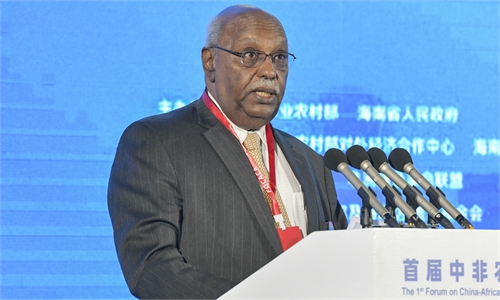The delegates are taking part in the UN Summit of the Future in New York, the US, on September 22, 2024. Photo: AFPFrom Sunday to Monday, local time, the United Nations (UN) organized the Summit of the Future in its New York headquarters, attended by more than 130 heads of state and government. The Summit's name emphasizes its core objective: to build a better world for future generations by focusing on current global challenges through the lens of the future. The Pact for the Future and its annexes, the Global Digital Compact and the Declaration on Future Generations, adopted at the Summit, represent a wish list crafted by the UN family based on the latest international consensus. They provide guidelines for action in areas such as peace and security, sustainable development, climate change, digital cooperation, human rights, gender, youth and future generations, as well as the transformation of global governance. This is not just a document; it is a vow to the future and a promise to future generations.
The Summit of the Future was held at a time when humankind stands at a crossroads, facing an urgent need to forge consensus. As UN Secretary-General Antonio Guterres said, this summit is crucial because "the challenges we face are moving much faster than our ability to solve them." At present, humankind is confronting severe and multiple tests: the risk of Lebanon becoming "another Gaza" has risen sharply, extreme weather is impacting the planet with alarming frequency, trade protectionism has sparked a backlash against globalization, and emerging technologies have created a crisis for which there is no existing governance experience to draw upon. At a time when the world is undergoing great transformation, renewing and reforming international cooperation should be a decisive first step. The convening of the Summit of the Future is not only an important assessment of the existing global governance system, but also a collective reflection on the future direction of the world.
The Pact for the Future, adopted by the Summit, sets out 56 pledges to action aimed at "laying the foundations for a sustainable, just, and peaceful global order - for all peoples and nations." Although considered by some to be "not as ambitious as originally intended," the pact still paints a picture of aspirational ideals: a world where the indiscriminate use of lethal weapons is avoided and greater peace and tranquility prevail; a world where multilateralism is practiced and developing countries have a greater say in international financial institutions; a world where renewable energy and sustainable development are pursued, and climate change is effectively curbed; a world where cyberspace security is guaranteed and global digital cooperation is realized. This is undoubtedly a world worthy of the struggle and dedication of all humankind.
Some media outlets have commented that the world body avoids diplomatic chaos at the Summit of the Future. The Pact for the Future, which has undergone "bargaining" among the representatives of member states, is not a legally binding document, but it reflects a hard-won consensus in an increasingly diverse international community. This once again highlights the central role and leadership of the UN in global affairs, as well as the value of genuine multilateralism in addressing challenges such as the climate crisis, inequality, and other unpredictable global risks. In the current complex international situation, effective collective efforts within the framework of the UN remain the optimal choice and the greatest common denominator.
As we enter a new era, we face the significant question of "what kind of a world we should build and how to build it." China has provided an answer: constructing a community with a shared future for mankind. Regarding the Summit of the Future, China has repeatedly expressed its support. At the recent Beijing Summit of the Forum on China-Africa Cooperation, China and Africa expressed unanimous support for the UN to hold the Summit of the Future. In addition, China has actively participated in consultations on the Pact for the Future, focusing on the future and destiny of humanity and universal well-being, and has put forward constructive opinions and suggestions to promote mutual understanding and consensus among all parties. These actions reflect China's commitment to promoting the construction of a community with a shared future for mankind, implementing the Global Development Initiative, Global Security Initiative, and Global Civilization Initiative, practicing true multilateralism, and jointly creating a better future for all humanity.
In the Pact for the Future, there is a statement that reads, "We recognize that sustainable development in all its three dimensions is a central goal in itself and that its achievement, leaving no one behind, is and always will be a central objective of multilateralism." Moving forward, the implementation of the Pact for the Future will require a strong commitment to seeking common ground while reserving differences, as well as close cooperation and coordination among countries, and the effective operation and support of multilateral institutions. Developed countries, which possess more resources and advantages in political, military, economic, technological, and educational aspects, should take on greater international responsibilities in maintaining regional peace, promoting global sustainable development, and addressing climate change, while also creating more opportunities for developing countries to participate in global governance.
In the process of building a safer, more sustainable, and fairer world, the voices of "Global South" countries must not be overlooked. The joint participation and contribution of both developed countries and "Global South" countries are crucial for achieving the ambitious goals of the Pact for the Future.
Source link
Experts warn Philippines may 'hijack' UN for own agenda at planned summitAs the general debate of the 79th session of the United Nations (UN) General Assembly is set to open on Tuesday, experts warn that the Philippines may “hijack” the UN platform to promote its own agenda by asserting its illegal claims in the South China Sea, given that Manila has previously stated its plan to hold a summit involving at least 20 countries targeting China on the sidelines of the General Assembly.
By Zhang Yuying and Du Qiongfang | 2024/9/23 20:12:33
The West should reflect on its hypocrisy and double standards regarding environmental issues, stop backpedaling on climate matters, and start contributing to a green future for all humanity.
By Global Times | 2024/9/2
 China makes vital contribution to global green development: experts
China makes vital contribution to global green development: experts
China is making a vital contribution to the global energy shift by providing high-quality and affordable new-energy solutions to overseas clients and investing heavily in its own green energy capacity, analysts and industry experts said on Monday, a day after the fourth anniversary of China's announcement of its "dual carbon




















